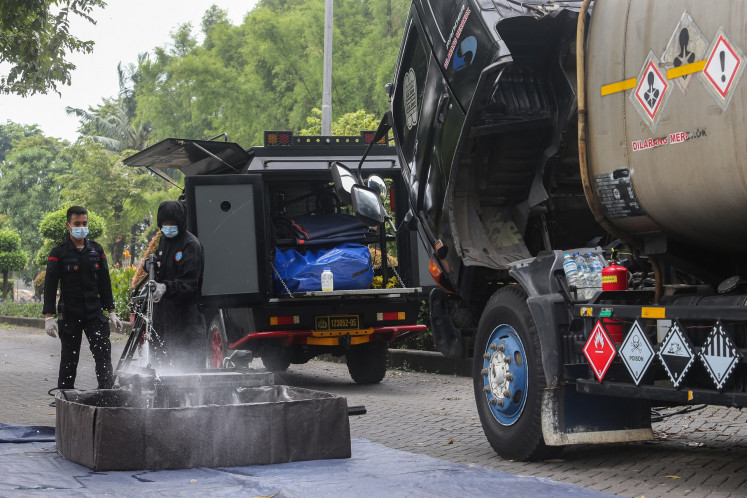Popular Reads
Top Results
Can't find what you're looking for?
View all search resultsPopular Reads
Top Results
Can't find what you're looking for?
View all search resultsArsenic confirmed in groundwater supply
High concentrations of arsenic in Indonesia's groundwater supply have been confirmed in a study by international scientists, leading to warnings of possible widespread contamination
Change text size
Gift Premium Articles
to Anyone
High concentrations of arsenic in Indonesia's groundwater supply have been confirmed in a study by international scientists, leading to warnings of possible widespread contamination.
The recent study by Lenny Winkel and his colleagues at the Swiss Federal Institute of Aquatic Science and Technology said 12 out of 97 tube wells checked in South Sumatra had arsenic concentrations exceeding WHO safety standards for drinking water of 10 micrograms per liter.
The finding confirms earlier predictions that groundwater in Sumatra lowlands is potentially contaminated with arsenic.
The scientists said Sumatra and other islands in the archipelago had topographic characteristics in common with known major arsenic-contaminated areas in Bangladesh, where up to 57 million people are chronically exposed to drinking water with unsafe levels of arsenic.
The characteristics include low topographic gradients and environments rich in organic C (such as that in tropical peat swamps), which are likely rich in arsenic. Once such soils are exposed to groundwater through the digging of wells, the arsenic content can contaminate the water.
"Based on the results of research conducted by the Swiss team, there is an indication that (groundwater) in 100,000 square kilometers on the eastern coast of Sumatra is at risk of arsenic contamination, threatening 15 million people living there," Budi Hidayat, the National Development Planning Ministry's director for settlement and housing, said Thursday.
"From what has occurred in Bangladesh, we know that the impact of arsenic contamination can only be seen clearly after a long period... Therefore the government needs to take action as early as possible to identify the potential contamination and its impact," Budi said as he opened a workshop on "Arsenic Contamination on Drinking Water", organized by the ministry.
Health Ministry researcher Inswiasri said well-digging was not the only source of arsenic contamination in groundwater in Indonesia.
She said the myriad mining sites in the country, especially in the eastern part, were constantly cutting deep and wide swathes in the ground, inevitably exposing the arsenic-rich soil layer to groundwater and river, and thus contaminating them with arsenic.
She admitted there was no available data on arsenic content in groundwater nationwide, but stressed the danger was obvious.
To date, Indonesia has only surveyed arsenic levels in a handful of mining areas, including a gold mine in Buyat Bay, North Sulawesi, a copper mine in West Nusa Tenggara, and a traditional gold mine in Gunung Mas, Central Kalimantan, where high arsenic concentrations in fish and oysters are causing illness in the local populace.
University of Indonesia public health expert Rachmadi Purwana said acute arsenic poisoning could cause violent stomach pain, vomiting and diarrhea, severe thirst, cramps, and eventually lead to coma and death.
Long-term exposure to arsenic-tainted drinking water can lead to garlic breath, excessive sweating, weak muscles, changes in skin color, peripheral vascular disease, hand and leg paresthesia (disturbance in neuron functions), blackfoot disease and skin cancer.










